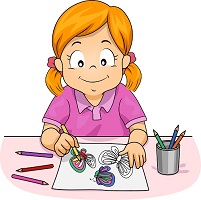Recently my niece and I had a fun afternoon making our own match game. I was gifted a set of blank matching cards and my girl and I divvied them up so we each had an even number.
You don’t need a fancy store bought set though. Instead, you can simply use posterboard or cardboard or thick construction paper.
Draw a grid on your paper so that there is an even number of equally sized squares (or rectangles, circles–really any shape you want will work as long as they are all the same–you could even do hearts!) These will be your match cards.
Cut out each shape and divide them up so that each person has an even number of match cards.
Keep your designs simple because you’ll need to draw the same thing twice. Working with sets of two, draw a pattern or picture on one card, and draw the same pattern or picture on it’s partner card. Now you have your first match. Continue until the set is complete.
Don’t worry if the pictures aren’t exactly the same–you aren’t trying to make it like a machine did it. It’s okay if there are slight variations in size and perspective, etc. Just make sure that both of you agree that the designs are close enough to be considered a match.
Once you’ve finished decorating the cards, lay them out, face down, on your playing surface. Make sure you mix them up so the matches aren’t next to each other!
A play consists of each person trying to turn over two cards that match.
If the two cards turned over DO match, that player keeps the cards and keeps getting another turn until they DON’T get a match.
Then it’s the next players turn to do the same.
When you turn over cards that don’t match, put them back in the same place. The challenge is to see if you remember where the matching cards are that have been turned over during non-match plays.
When all the cards are gone, whoever has the most set of double cards wins the game!
Hint: when you and your child are engaged in this project together, it’s a perfect time to play music and sing together, or just chat. It’s sometimes easier to have good conversations when both people are engaged in a simple task.

